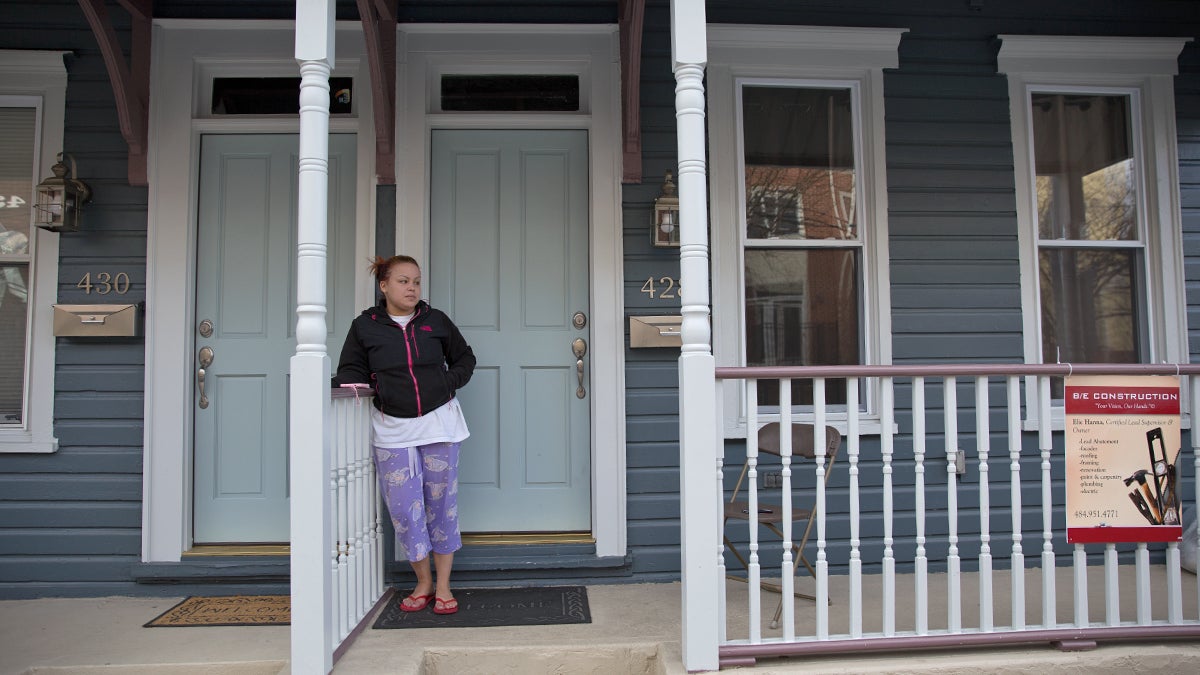Community land trusts across Pa. form collaboration

Bethlehem resident Tiffany Gonzalez stands on the front porch of her home on Hayes Street. Recently
The groups work to increase affordable housing in their own communities.
Community land trusts across the state are joining forces. The Pennsylvania Community Land Trust Collaborative launched last week, with 10 participating groups from Pittsburgh, Philadelphia, the Lehigh Valley and Centre County.
A community land trust is an organization that buys unused land for the sake of preserving it for certain uses. Some CLTs focus on urban gardening or other land use, but most are for affordable housing. The CLT, usually associated with a non-profit organization, will buy land and either build a home on the lot or improve a home that already exists. They’ll then sell the house at a reduced cost, while still retaining ownership of the land.
Take, for example, the Lehigh Valley Community Land Trust, which owns 22 properties. While the houses may be bought and sold, the land itself is deeded to be used for affordable housing for the next 99 years.
“That’s a pretty powerful tool,” said Mike Handzo, the director of the LVCLT. “No matter what the real estate market might be doing in 50 or 75 years from now, the house we develop today, a unit meant to be affordable to a working family here in the Lehigh Valley, will continue to serve that purpose.”
As Keystone Crossroads has reported, CLTs are growing in popularity nationwide, but Pennsylvania has been slow to adopt them. There are about 100 CLT properties statewide, while other cities — Boston, for example — have more than that in a single trust.
Handzo hopes the collaboration will help with that.
“There’s an education factor to land trusts, where it’s not something people have heard of before,” he said. “But there’s usually that ‘wow’ moment when I tell people about the idea. I hope that our collective voices, all of us working together, will help raise awareness about land trusts.”
In Pittsburgh, the community land trust idea is just starting to take off. The Lawrenceville Corporation, which is one of the 10 members of the collaboration, is preparing to buy the first land trust homes in the city. Ed Nusser, land use coordinator for the Lawrenceville Corp., says this collaboration is coming at the right time.
“Any lessons we can learn from state partners that have been doing this longer than us will be helpful,” said Nusser. “Groups that have been doing this for five, 10, 15 years, we can learn how they have navigated the waters of operating a land trust.”
In preparing to launch the city’s first land trust, Pittsburgh was already thinking about a regional collaboration, what they are calling a hub and spoke model.
“A 2015 feasibility study suggested the region create a central hub to handle the technical assistance, the fundraising assistance, possibly development assistance, but empower neighborhood groups to do on-the-ground land trust work, making them the spoke,” said Nusser.
The regional collaboration will be participating in the statewide association as well. Five of the 10 land trusts are based in the Pittsburgh region.
The PCLTC will be made up of the Lehigh Valley Community Land Trust, the Allegheny Land Trust, Centre County Housing and Land Trust, Community Justice Land Trust in Philadelphia, Lawrenceville Co. of Pittsburgh, Mosaic CLT of Pottstown, State College Community Land Trust, Pittsburgh Community Reinvestment Group, Regional Housing Legal Services and Grow Pittsburgh.
Land trusts across Pennsylvania haven’t often collaborated before. Handzo says he was more likely to learn from the national organization that the LVCLT belongs to. But he’s excited to be able to work with local groups facing the same Pennsylvania-specific challenges. Nora Lichtash, executive director of the Women’s Community Revitalization Project, which runs the Community Justice Land Trust, said those challenges were the motivation to form a collaboration.
“We’ve come to realize the work does not just get done in the neighborhood,” said Lichtash. “There are rules and regulations that happen citywide and statewide that really affect our ability to develop afforadble housing. We want to be in coalition with other groups to work with them, learn from them and do advocacy with them.”
Lichtash and the Women’s Community Revitalization Project started talking with other CLTs in November. The first meeting of the PCLCT was last week, and they hope to meet four times a year — at least officially.
“There may be reasons we’d want to meet up to do advocacy or visit each others CLTs to learn from each other,” said Lichtash. “There could be some less formal meetings. Just getting all those people doing the same work in a room together…it felt really good.”
WHYY is your source for fact-based, in-depth journalism and information. As a nonprofit organization, we rely on financial support from readers like you. Please give today.


